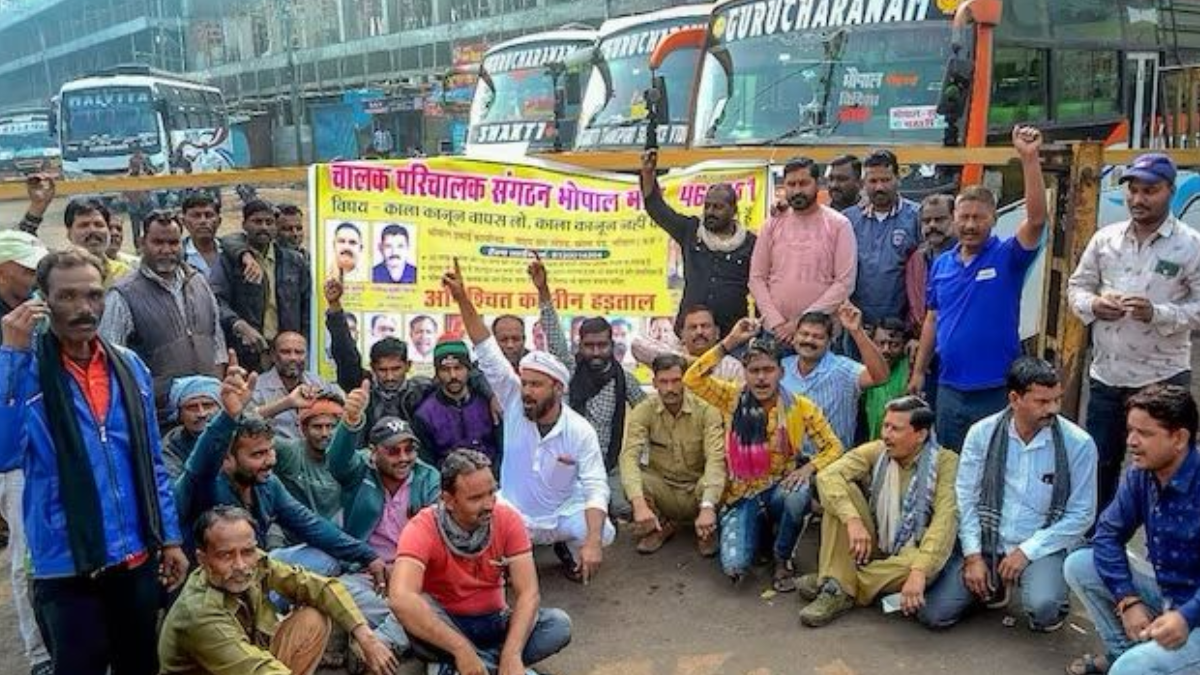Truckers and bus drivers all over India are expressing their discontent with the recently introduced Bharatiya Nyaya Sanhita Bill, a new criminal code set to replace the IPC, which encompasses a comprehensive hit-and-run law.
Table of Contents
Under this legislation, offenders face a substantial penalty of Rs 7 lakh and a maximum prison sentence of 10 years if they flee the scene or fail to report the crime. The repercussions of this legal shift were vividly felt as the arrival of the New Year in India was marred by extensive traffic congestion and lengthy queues at petrol pumps.
The crux of the matter lies in a nationwide protest initiated by truck drivers, spanning a three-day duration starting on Monday. This collective action involves the obstruction of major highways and roads across the country. The primary demand voiced by the protesting drivers revolves around seeking clearer elucidation from the government regarding the modification in the “Hit and Run” provision within the Indian Penal Code, specifically the section pertaining to “Death by Negligence.”
This legal amendment stems from the enactment of the Bharatiya Nyay Sanhita (BNS) Bill in 2023. The drivers’ plea for further clarification underscores their concerns and emphasizes the need for a comprehensive understanding of the implications of the legislative change.
What is this new BNS Bill?
Under the Bharatiya Nyaya Sanhita, the penalty for individuals involved in road accidents resulting in fatalities has been significantly heightened, now carrying a potential sentence of up to 10 years of imprisonment. This marks a notable departure from the provisions outlined in the current Indian Penal Code, where the maximum sentence for unintentional manslaughter due to a car accident was limited to two years of imprisonment.
The Bharatiya Nyaya Sanhita clearly mentions that anyone causing the death of another person through a careless or negligent act, not amounting to culpable homicide, can face imprisonment for up to seven years and may also be fined. Moreover, the new law introduces severe consequences for those who choose to flee the scene or neglect to report the crime promptly. Offenders in such situations may face a substantial penalty of ₹7 lakh and a maximum prison term of ten years.
Anticipated to come into effect in April 2024, the bill is currently awaiting presidential assent, stirring a wave of concern and protest within the trucking community, which fears the potential ramifications of these stringent measures on their livelihoods.
Truckers across India are upset about the new bill
Truckers across India are expressing their discontent with the impending Bharatiya Nyaya Sanhita Bill, a new criminal code set to replace the existing Indian Penal Code (IPC). One particular point of contention revolves around the inclusion of a stringent hit-and-run law within the proposed legislation.
Syed Wajed, a tanker driver from Maharashtra, voiced concern over the hefty fines imposed on drivers, emphasizing the financial burden.
On Monday, truckers staged “rasta roko” protests across Maharashtra, causing disruptions on the Mumbai-Ahmedabad Highway. Reports indicate that in Thane’s Mira Bhayandar area, drivers briefly halted traffic, leading to clashes with police, resulting in injuries. Officials assured control in Navi Mumbai and other regions, while protests affected Solapur, Kolhapur, Nagpur, and Gondia.
In Chhattisgarh, over 12,000 private bus drivers held protests, causing inconvenience to travelers at stops in Raipur, Bilaspur, Durg, and Rajnandgaon. Meanwhile, in West Bengal’s Hooghly district, truck and commercial vehicle drivers took to blocking National Highway 2 near Dankuni toll plaza on Sunday, demonstrating against new penal laws for hit-and-run cases, as reported by the police.
The diverse protests underscore a widespread discontent among drivers across different regions, reflecting concerns over fines and legal provisions.
In Moga, truckers initiated a protest causing traffic snarls on the Ludhiana-Ferozepur Road. Transporters assert that truck drivers have congregated at the Shambhu border, near Ambala, hindering truck movement.
In Bhopal, drivers blocked city buses and cars at Lalghati during the demonstration, and some protesters gathered at MP Nagar’s Board Office Square. Meanwhile, certain Pune-based associations are gearing up for the January 3 protest at Delhi’s Jantar Mantar, while others view it as a necessary step and seek clarification on stakeholder involvement
Transport groups are seeking government attention on their concerns regarding the matter
Truckers and transport groups have urgently called on the government to address concerns surrounding accidents involving large vehicles. The All India Motor Transport Congress (AIMTC), the nation’s largest truckers’ organization, wrote to Prime Minister Narendra Modi and Home Minister Amit Shah, expressing worry that police often blame trucks for accidents without thorough investigations.
They highlighted the risk of drivers facing violent mobs at accident scenes. AIMTC urged drivers to remain patient, uphold law and order, and emphasized the need for constructive dialogue with authorities. Bal Malkit Singh, AIMTC’s core committee chairperson, stressed the importance of resolving issues through fair discussions.
Addressing a different perspective, the Indian Gig Workers Front (IGWF) reached out to authorities, seeking clarification on the classification of certain actions as criminal offenses subject to bail. IGWF President Keshav Kshirsagar mentioned concerns about misinformation regarding the Bill’s potential impact on drivers.
